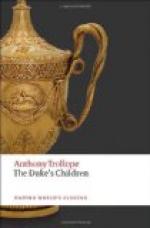‘I have had a correspondence with your father, Mary,’
‘Indeed.’
‘And unfortunately one that has been far from agreeable to me.’
‘I am sorry for that, Mrs Finn.’
So am I, very sorry. I may say with perfect truth that there is no man in the world, except my own husband, for whom I feel so perfect an esteem as I do for your father. If it were not that I do not like to be carried away by strong language, I would speak of more than esteem. Through your dear mother I have watched his conduct closely, and have come to think that perhaps no other man at the same time so just and patriotic. Now he is very angry with me,—and most unjustly angry.’
‘Is it about me?’
’Yes;—it is about you. Had it not been altogether about you I would not have troubled you.’
‘And about-?’
’Yes;—about Mr Tregear also. When I tell you that there has been a correspondence I must explain that I have written one long letter to the Duke, and that in answer I have received a very short one. That his been the whole correspondence. Here is your father’s letter to me.’ Then she brought out of her pocket a note, which Lady Mary read,—covered with blushes as she did so. The note was as follows:
’The Duke of Omnium understands from Mrs Finn’s letter that Mrs Finn, while she was the Duke’s guest at Matching, was aware of a certain circumstance affecting the Duke’s honour and happiness,—which circumstance she certainly did not communicate to the Duke. The Duke thinks that the trust which had been placed in Mrs Finn should have made such a communication imperative. The Duke feels that no further correspondence between himself and Mrs Finn on the matter could lead to any good result.’
‘Do you understand it?’ asked Mrs Finn.
‘I think so.’
’It simply means this,—that when at Matching he had thought me worthy of having for a time the charge of you and your welfare, that he had trusted me, who was the friend of your dear mother, to take for time in regard to you the place which had been so unhappily left vacant by her death; and it means also that I deceived and betrayed that trust by being privy to an engagement on your part, of which he disapproves, and of which he was not then aware.’
‘I suppose he does mean that.’
’Yes, Lady Mary; that is what he means. And he means further to let me know that as I did so foully betray the trust which he had placed in me,—that as I had consented to play the part of assistant to you in that secret engagement,—therefore he casts me off as altogether unworthy of his esteem and acquaintance. It is as though he had told me in so many words that among women he had known none more vile or more false than I.’
‘Not that, Mrs Finn.’
’Yes, that;—all of that. He tells me that, and then says that there shall be no more words spoken or written about it. I can hardly submit to so stern a judgement. You know the truth, Lady Mary.’




